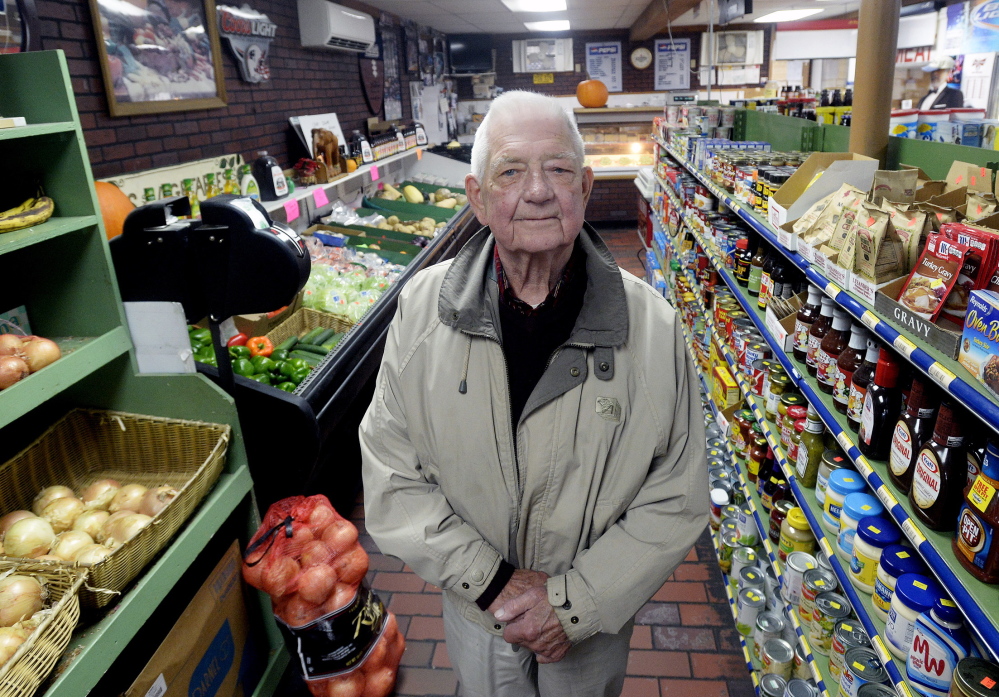Bernie Larsen and his brother-in-law, Tommy Moran, opened a small market on Forest Avenue in Portland’s Riverton neighborhood in 1956. Moran died a few years later, but Larsen kept the name of the store – Moran’s Market – and has continued to run the shop since. It became a true mom-and-pop store when Larsen’s wife, Dorothy, joined her husband at the business, which has become a neighborhood fixture. Dorothy died two years ago, but Larsen said the store has kept going despite serious challenges, including the arrival of convenience stores, fast-food restaurants and a supermarket within a short distance of his store. Recently a citation from Portland police for selling alcohol to an underage customer added to his challenges.
Q: How have you adapted to so much competition nearby?
A: Sunday business was a big thing with us (before 1990, when a state law that barred most large stores from opening on Sundays was repealed). When that changed, we decided to look into more of the food service business. I remembered they had a salad bar in the art gallery downtown and I thought it should go in my store. That took off, and then I put in a hot bar for a lunch buffet. The meat (butcher’s shop) has always been stable. On groceries, I can’t buy like Hannaford can, but we can compete in produce, and in the summer we have good connections on the native products.
Breakfast is a big thing with us. And I’ll sell a lot of hamburger because we grind it here, cut it here, and we do 150 sandwiches a morning.
We put on a couple of additions over the years and put apartments in upstairs. We’ve grown and I’ve got good help – my two boys work here and my grandsons, also. My boys do all the cooking. They’re very good, but they didn’t get it from me. They must have gotten it from their mother.
We’re not dead, it’s just a little struggle.
Q: What’s been the biggest challenge over the years?
A: Hannaford (building a supermarket nearby) put the damper on our grocery (sales). It hurt, but it’s amazing to me that we’re still doing well. That’s a big outfit. Before the blue laws were changed, that’s when I made some money, but it was bound to come.
Q: Moran’s was recently cited, along with about a dozen other stores in Portland, for selling alcohol to an underage customer. What happened?
A: I had a new girl put on the register and another one was supposedly there to instruct her, but she was down doing the payroll. She was just inexperienced, but that’s the first thing you tell them, to check IDs. They (Portland police) have been in and checked again three times since then and we passed.
Q: Why are you continuing to work at 85?
A: There’s still that touch, that personal touch. People just love to come in and that’s why I’m still working – I enjoy people. I work six days a week, but I go in at 6 (a.m.) and get out at 1 (p.m.), so I don’t want to sound like a hero. It keeps me young, even though my body says no.
Q: What was it like to open a shop in 1956?
A: It was not as bad as it is now. Government and paperwork is a killer. It’s terrible. You have to deal with workers’ comp and the Department of Labor or (the Department of) Health and Human Services. And it’s hard to get good help. We have to screen them to make sure they’re responsible.
Q: You said your sons work in the store?
A: I have two. Peter Larsen and Paul Larsen.
Q: Are you planning to pass the store to both of them, 50-50?
A: Yes, but I worry about it, because in-laws are always a problem.
Q: What’s the future look like for stores like yours?
A: I don’t think it looks too good. You have to be a full-service type like myself. You have to be very flexible and there’s more I’d like to do to help the business. I’d like to get in a rotisserie and have chicken and roast my own roast beef. That’s very popular. And we’re always looking for more bakery products, homemade.
I’m not as good as I should be, but I feel like I’ll go another few years, as long as I feel able.
Send questions/comments to the editors.



